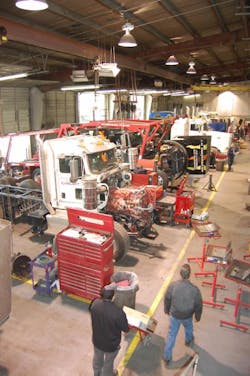Let’s just take truck technicians, for starters and think on this for a minute: they used to be called “mechanics” as the job entailed a lot of wrench turning and heavy lifting. Nowadays, though, “technician” is much more apt, in no small part because a high degree of technical skill, especially with computers, is required.
“The days of the ole shade tree are approaching an end [as] technicians are forced to be computer literate and most have to daily interface with some sort of electronic device daily to perform their jobs,” Allen Caldwell, manager of maintenance technology for First Fleet in Portland, TN, and chairman of Technology & Maintenance Council’s S.12 Study Group, told by email recently.
“Technicians are now entering the realm of almost a surgeon or doctor. Although it may not require a college degree, the amount of training and the skills employed by technicians deems them special in their own right,” he explained. “If you can find a technician with an IT [information technology] or geek background it is most certainly more of a win than a guy that can swing a clutch in four hours. We have guys that can fix any issue, but they have to be able to troubleshoot and find out the cause, or have techs on staff that can troubleshoot and defer to them for the repairs.”
That, then, is why the growing “skills gap” in today’s workforce matters so much – and why finding a way to close that gap is becoming a worrisome issue in the broader business community.
Indeed, a recent survey of U.S. executives at large companies by global consulting firm Accenture found that a skills gap persists for their businesses, with nearly half (46%) concerned that they won’t have the skills they need in the next one to two years.
In a positive sign, though, Accenture’s poll indicated 51% of companies expect to increase investments in training over the next two years, with 35% of executives whose companies are facing a skills shortage admitting that they haven’t invested enough in such training in the past.“It’s clear that U.S. businesses are looking to take a more active role in solving the skills challenge, and that failing to do so can result in significant business consequences,” noted David Smith (at left), senior managing director of Accenture’s talent and organization practice. “Developing more effective and targeted training programs is a critical element in improving the skills of the workforce.”
Accenture’s 2013 Skills and Employment Trends Survey: Perspectives on Training survey polled 400 executives at large U.S. companies to get a feel for hiring, staffing and training strategies.
While nearly three-quarters (72%) of executives identified training as one of the top ways for employees to develop new skills, only 52% of workers employed by the companies surveyed currently receive company-provided, formal training. By comparison, a previous Accenture survey found that only 21% of U.S. workers said they received company-provided formal training between 2006 and 2011.
For those executives who have or are anticipating a skills shortage, the biggest demand is for IT skills (44%) and engineering (36%) with R&D (29%) and sales (29%) close behind; these skills are particularly in demand among manufacturers, Accenture noted. When looking at hiring overall, the retail, transportation, telecommunications and utilities industries are most in need of leadership, communications, people management and project management skills, the firm said.
The survey also found that businesses are facing big consequences as a result of not fixing their skills gap. Among companies currently facing or anticipating a skills shortage, 66% anticipate a loss of business to competitors, 64% face a loss of revenue, 59% face eroding customer satisfaction and 53% say they will face a delay in developing new products or services, according to Accenture’s findings.The inability to train employees with needed new skills, or to hire enough workers with relevant skills, is also causing additional pressure and stress for the majority (87%) of companies’ existing employees, the firm added.
Those concerns tie directly to the truck technician shortage now plaguing the industry. Indeed, I talked to Mike Besson (seen on the left in the photo at right), VP-service operations at Rush Truck Centers, about this very topic last year.
“It’s not just tough to get technicians. It’s tough to find the next generation of shop managers, too: the shop foremen and service manager," he pointed out to me during his company’s 2012 Technician Skills Rodeo held in San Antonio TX last year. [And I’m looking forward to attending the 2013 iteration of this event six weeks or so from now.]
"That’s one reason we started a mentoring program [in 2011]; not just to provide more support to our less experienced technicians but also to help us find and develop leadership qualities in out more senior techs so they can take they step up in their careers,” Besson told me.“The mismatch of skills needed and skills available is forcing organizations to rethink everything from how they define jobs to how they mine their organizations for hidden talent to how they recruit and evaluate candidates,” echoed Katherine Lavelle (seen at left), managing director of Accenture’s talent and organization practice for North America.
“Companies are increasingly looking outside their industries for potential candidates, and they are evaluating broader generalist skill sets and competencies so that they can quickly build on these to develop more specific skills for a job,” she added.
Indeed, nearly one-third (31%) of executives surveyed by Accenture anticipate increasing their workforce over the next one to two years, while 62% expect their hiring to remain the same.
Yet among those who have or anticipate a skills shortage, challenges remain, with 41% saying it is because they can’t attract candidates with the skills they need to their industry, 38% planning to hire more people if they were getting qualified candidates, 26% unable to pay what candidates want and 19% not anticipating that they could find the skills they need.
Accenture also compiled some advice for companies trying to tackle this skills gap:
- Find a balance between formal and informal learning. As digital technology blurs the boundaries between formal and informal learning, companies should consider ways to strike a balance between the two and help ensure that they work in tandem. For instance, embedding learning in everyday work – shadowing others, mentorships, or learning from peers through online forums – can help formal online or classroom training become more relevant and more effective.
- Embrace new ways to develop skills. Other recent scalable developments are helping training become more relevant, such as social media tools that facilitate collaboration and knowledge sharing, including “gamification” that immerses employees in virtual scenarios, and mobile training delivery that allows learning to take place wherever and whenever an employee happens to be.
- Expand your candidate pool. Given the reported difficulty of finding qualified candidates, companies should consider dropping the notion of finding the “perfect” candidate based on a list of specific skills, education or experience. Instead, they could look for candidates with more generalist skills – even those outside their industry, in other geographies, or with adjacent or overlapping skill sets – that can easily be developed to perform the job.
- Screen talent based on newly emerging data sources. Instead of screening potential candidates based on key words in a resume, exploit new data sources as part of the effort to get fuller and more predictive insights into future performance. For example, emerging websites offer samples of a candidate's work, assessments that gauge a person's cultural fit and motivations, or social media contributions that can reveal their interests.
- Invest earlier in the talent supply chain. Leading companies are partnering with colleges and universities to review and revise curricula so relevant skills are acquired as part of their programs. Some companies are even setting up open access training programs to ensure that more people have the skills they need in specific regions. Once trained, the first right of employment is with the company that trained them.
Some tweaks of course may be needed to apply the above to trucking, but it’s worth adding those suggestions to the mix as carriers try to figure out ways of finding, hiring, and then keeping workers with the vital skill sets necessary for forging success in the freight world.




